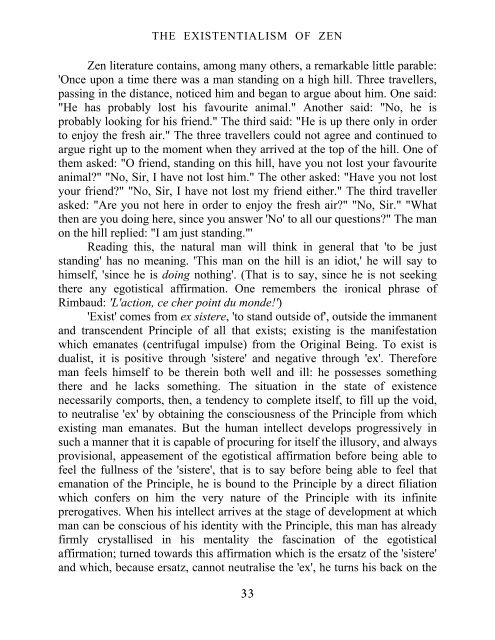The Supreme Doctrine - neo-alchemist
The Supreme Doctrine - neo-alchemist
The Supreme Doctrine - neo-alchemist
Create successful ePaper yourself
Turn your PDF publications into a flip-book with our unique Google optimized e-Paper software.
THE EXISTENTIALISM OF ZEN<br />
Zen literature contains, among many others, a remarkable little parable:<br />
'Once upon a time there was a man standing on a high hill. Three travellers,<br />
passing in the distance, noticed him and began to argue about him. One said:<br />
"He has probably lost his favourite animal." Another said: "No, he is<br />
probably looking for his friend." <strong>The</strong> third said: "He is up there only in order<br />
to enjoy the fresh air." <strong>The</strong> three travellers could not agree and continued to<br />
argue right up to the moment when they arrived at the top of the hill. One of<br />
them asked: "O friend, standing on this hill, have you not lost your favourite<br />
animal?" "No, Sir, I have not lost him." <strong>The</strong> other asked: "Have you not lost<br />
your friend?" "No, Sir, I have not lost my friend either." <strong>The</strong> third traveller<br />
asked: "Are you not here in order to enjoy the fresh air?" "No, Sir." "What<br />
then are you doing here, since you answer 'No' to all our questions?" <strong>The</strong> man<br />
on the hill replied: "I am just standing."'<br />
Reading this, the natural man will think in general that 'to be just<br />
standing' has no meaning. 'This man on the hill is an idiot,' he will say to<br />
himself, 'since he is doing nothing'. (That is to say, since he is not seeking<br />
there any egotistical affirmation. One remembers the ironical phrase of<br />
Rimbaud: 'L'action, ce cher point du monde!')<br />
'Exist' comes from ex sistere, 'to stand outside of', outside the immanent<br />
and transcendent Principle of all that exists; existing is the manifestation<br />
which emanates (centrifugal impulse) from the Original Being. To exist is<br />
dualist, it is positive through 'sistere' and negative through 'ex'. <strong>The</strong>refore<br />
man feels himself to be therein both well and ill: he possesses something<br />
there and he lacks something. <strong>The</strong> situation in the state of existence<br />
necessarily comports, then, a tendency to complete itself, to fill up the void,<br />
to neutralise 'ex' by obtaining the consciousness of the Principle from which<br />
existing man emanates. But the human intellect develops progressively in<br />
such a manner that it is capable of procuring for itself the illusory, and always<br />
provisional, appeasement of the egotistical affirmation before being able to<br />
feel the fullness of the 'sistere', that is to say before being able to feel that<br />
emanation of the Principle, he is bound to the Principle by a direct filiation<br />
which confers on him the very nature of the Principle with its infinite<br />
prerogatives. When his intellect arrives at the stage of development at which<br />
man can be conscious of his identity with the Principle, this man has already<br />
firmly crystallised in his mentality the fascination of the egotistical<br />
affirmation; turned towards this affirmation which is the ersatz of the 'sistere'<br />
and which, because ersatz, cannot neutralise the 'ex', he turns his back on the<br />
33




